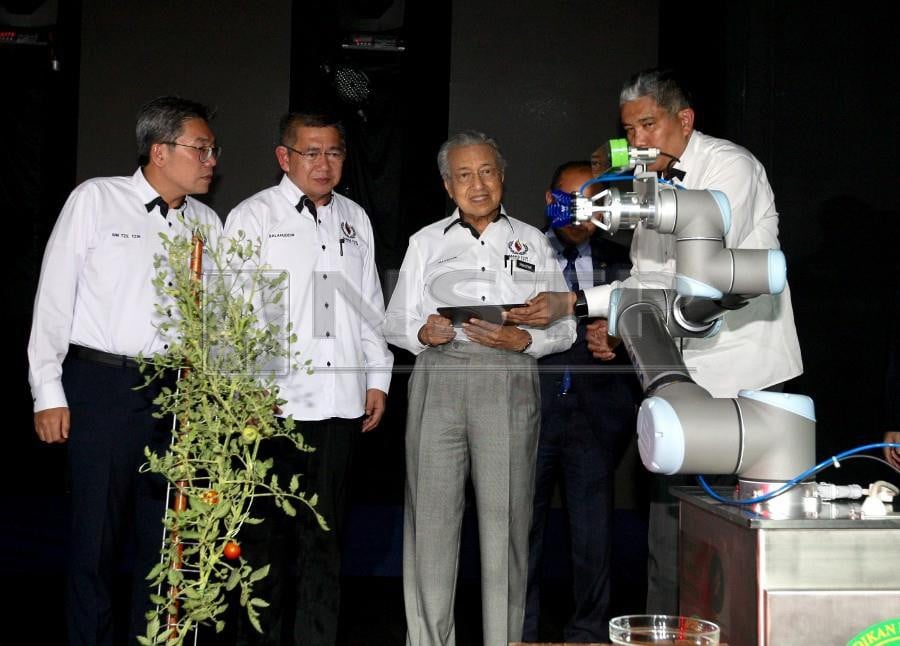SERDANG: The government is conducting a study to draft the Agro Food Policy 2.0 (2021 - 2030) in order to spur the agro food sector in line with technological development and Industrial Revolution 4.0, says Tun Dr Mahathir Mohamad.
The prime minister said the policy will coordinate and streamline investments from both the government and private sectors for infrastructure development, human capital development, research, commercialisation as well as innovation in the in agriculture sector.
“The new policy will also realign the strategy to expedite the modernisation process apart from managing food supply and demand.
“This is in line with the government’s aim of boost the competitiveness of the agro food sector,” he said at the launch of the 2018 Malaysia Agriculture, Horticulture and Agrotourism (MAHA) Exhibition at the Malaysia Agro Exposition Park Serdang.
Also present was the prime minister’s wife Tun Dr Siti Hasmah Mohd Ali; Chief Secretary to the Government Datuk Seri Dr Ismail Bakar and Agriculture and Agro-based Industries Minister Datuk Salahuddin Ayub.
The twice-yearly event, which gathers the best agricultural products nationwide, is expected to draw around 3.5 million visitors with a sales target of RM300 million.
Meanwhile, the prime minister said the government will also develop an alternative input and new sources of revenue such as pineapples, coconuts, watermelons, star fruits and durian, which has good global demand and high economic value.
He said these new revenue sources will be exploited fully through various research, development and business efforts.
“To ensure success, the government is committed towards optimising existing facilities and logistic assets, which cover storage and distribution centres, as well as transportation.
“Indirectly, the entire agro food sector value chain will be capitalised on, thus enabling farmers, breeders, fishermen and agricultural entrepreneurs gain greater economic threshold, access to a bigger market and a more efficient supply chain,” he said.
Dr Mahathir said that at the same time, the move will reduce dependency on middlemen.
The agricultural sector, he said, would remain relevant as it is no longer seen as merely a food producer but is now accepted as a key factor in ensuring Malaysia’s food security.
“Although food security has been defined as having enough food supply for everyone at all time, without stressing on whether it is domestically-produced or imported, Malaysia, which has a long agriculture history, must ensure that a large portion of the supply is dependent on local producers.
Malaysia, he said, is blessed with fertile land and surrounded by seas rich with food sources, adding that the government would look into drawing up a specific blueprint on food security.
He also called on players in the agriculture sector to keep abreast with technological developments or risk being left behind as Industrial Revolution 4.0 would trigger disruption in the old ways of doing things.
“Like it or not, digitalisation or the use of digital equipment as well as new technology will boost productivity for all sectors including the agriculture sector,” he said, adding that the government had taken various measures to ensure that people from all sectors would not be left behind or sidelined.
The prime minister also said although the agriculture sector’s contribution to the gross domestic product was small, it has huge potential.
Compared to 2016, Dr Mahathir said the sector’s contribution to the GDP rose from 8.07 per cent to 8.17 per cent in 2017.
“It may have a small percentage but the economic value of the agro food sector is still significant at RM37.4 billion for 2017 compared to RM36.7 billion the year before.
“In this respect, there is a big potential for the agro food sector to raise its output so that Malaysia’s food security remains intact without relying fully on imported supply,” he said.
Reports by: Azura Abas, Manirajan Ramasamy, Irwan Shafrizan Ismail, Rizanizam Abdul Hamid


